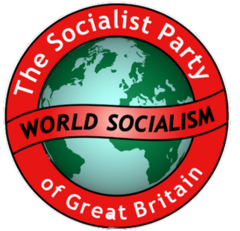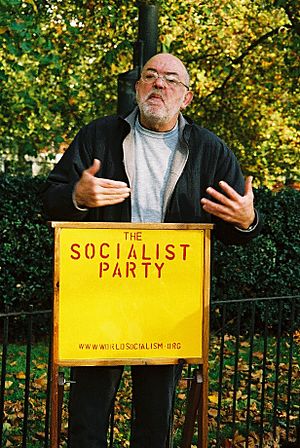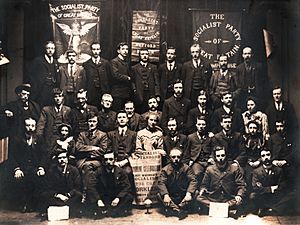Socialist Party of Great Britain facts for kids
Quick facts for kids
Socialist Party of Great Britain
|
|
|---|---|
 |
|
| Abbreviation | SPGB |
| Leader | None |
| Founder | Jack Fitzgerald |
| Founded | 12 June 1904 |
| Split from | Social Democratic Federation |
| Headquarters | 52 Clapham High Street, Clapham, London |
| Newspaper | Socialist Standard |
| Ideology |
|
| Political position | Left-wing |
| International affiliation | World Socialist Movement |
| Colours | Red |
| Slogan | World Socialism |
The Socialist Party of Great Britain (SPGB) is a small socialist political party in the United Kingdom. It was started in 1904 after some members left another group called the Social Democratic Federation (SDF). The SPGB believes in using elections to bring about big changes in society. They are against ideas like Leninism (which supports a small group leading a revolution) and reformism (which means making small changes to the current system). The party thinks that countries which said they were "socialist" were actually "state capitalist". This means the government controlled everything, but it was still a form of capitalism. The SPGB's way of thinking is sometimes called "impossibilism". This means they believe in waiting for the right time for a complete change, rather than trying to make small fixes.
Contents
History of the SPGB
How the Party Started
The SPGB began in 1904. Its founders left the Social Democratic Federation (SDF) because they felt the SDF was too focused on small changes instead of a full revolution. They also didn't like how much Henry Hyndman controlled the SDF. This is why the SPGB does not have a single leader. The split also happened because the SDF was involved with the Labour Representation Committee, which later became the Labour Party.
The SPGB founders were part of a bigger movement called "impossibilism" within the Second International (a group of socialist parties). Unlike some other groups, the SPGB believed in using the ballot box and parliament to achieve their goals.
Groups That Left the SPGB
Over the years, there have been some disagreements within the SPGB. For example, members debated the party's view on the Spanish Civil War in 1936 and the Hungarian Uprising of 1956. Sometimes, small groups of members left the party because they had different ideas about how to achieve socialism. These disagreements were usually about the party's main beliefs. However, only a few of these disagreements led to groups completely breaking away.
What the SPGB Believes
Revolution and Change
The SPGB sees itself as a revolutionary party. This means they want a complete change in society. They believe in the class struggle, which is the idea that different groups in society (like workers and business owners) have different interests. However, they do not believe in violence or civil war. As they explain in one of their pamphlets:
The kind of violent revolution that brought capitalism to many countries is now old-fashioned. Today, four main things make it important to work for a peaceful, democratic revolution using the voting system where it exists:
- Most modern capitalist countries have very strong armies, lots of information, and are rich and powerful. An armed uprising trying to overthrow the government would likely fail.
- If violence is used to start a new system, that system can only be kept going by violence. A socialist society cannot be built this way.
- There is no way to know if a violent movement truly represents what most people want. Many workers would be against it because it is violent. Only a vote can show that most people want to get rid of capitalism.
- A very large majority vote makes violence unnecessary. It shows that fighting against the change would be pointless.
The SPGB believes that socialism will only happen when most people around the world believe it is a better way to live. They support the idea of impossibilism. This means they aim to achieve socialism through elections, without making compromises. Right now, their main job is to spread their ideas and "make socialists" by helping people understand their views. Unlike Leninists, they think society can change from capitalism to socialism right away once most people decide to do it.
What is Socialism?
The SPGB has a clear goal that they print on all their materials. This goal is:
The establishment of a system of society based upon the common ownership and democratic control of the means and instruments for producing and distributing wealth by and in the interest of the whole community.
This means they want a society where everyone owns and controls the ways we make and share wealth, like factories and farms. They believe that in a truly socialist society, there would be no need for money. They think this can be managed by keeping track of goods, similar to how supermarkets manage their stock. This would ensure that people can take what they need.
Following Karl Marx's Ideas
The SPGB says they follow the ideas of the philosopher Karl Marx. However, they follow his ideas because they believe they are correct, not because Marx was a special person. They sometimes quote Marx himself, who said, Je ne suis pas marxiste ("I am not a Marxist"). The SPGB often challenges how the media uses the word "Marxist" to describe groups that have nothing to do with what the SPGB believes is true working-class freedom.
State Capitalism
The party does not agree with the idea that "socialism has existed before and failed." They believe that countries which claimed to be socialist were actually "state capitalist." This means the government controlled the economy, but it still worked like capitalism. The SPGB argues that socialism cannot exist in just one country; it must be a worldwide system. They believe socialism will only happen when most people want it and work together to create it.
When the Russian Revolution happened, the SPGB praised the Bolsheviks for ending Russia's involvement in the Great War. However, they warned that Russia, with its many uneducated farmers, was not ready for a true socialist revolution. They pointed out that the voting system gives workers a way to gain freedom. They said that until workers learn to use this tool properly, they are not ready for socialism. The idea that the Soviet Union was state capitalist grew over time, especially because wages and money still existed there, showing that capitalism had not been removed.
Fascism
Unlike some other left-wing groups, the SPGB did not see fascism as a special threat to working people. They viewed it as a type of reform movement. They noticed that fascism often brought nations together, like Germany, Italy, and Spain. They also saw that it often had the support of many working-class people.
The SPGB believed that if working people supported fascism, then fascism would succeed. They did not join anti-fascist groups. Instead, they argued that promoting socialism was the best way to deal with fascism.
Nationalism
The SPGB has always been against nationalism, which is the idea of favoring one's own country above all others. They argue that nationalism just means choosing one set of rulers over another. They believe that socialism is the only way for people to truly be free.
More than almost anything else, we Socialists are internationalists. We belong to the international working class. Our problems are international; our only hope is international, and our enemy is international also.
The SPGB believes in internationalism for all workers. They have rejected national liberation struggles, saying they are a waste of workers' lives while capitalism remains. For example, they spoke against the Irish Easter Rising and the fight for freedom in Ireland.
Democracy
The SPGB is committed to using the ballot box to achieve its revolution. However, their focus on democracy is mainly about giving working people enough power to make their revolution happen. They do not get involved in debates about things like proportional representation or changes to Parliament, because they believe the current system already offers enough ways for working people to express their will.
For example, they were against the suffragettes (women fighting for the right to vote) because the proposed changes would have given more voting power to wealthy women, which they felt would not help the working class.
Later, in the 1920s and 1930s, the party started to argue that workers needed enough "elbow room" (freedom) to organize for a socialist revolution. So, they supported workers fighting for democracy and basic freedoms. However, they said that socialists should not team up with any pro-capitalist groups to achieve this.
In the 1980s, this idea was extended to supporting the fight for democracy in Central and Eastern Europe, especially Solidarity in Poland.
The SPGB is against vanguardism (the idea that a small group should lead the revolution). They also believe that capitalism cannot be reformed to truly benefit the working class. They refuse to take part in direct action or work with political parties that do not agree with their founding principles. The SPGB and its partner parties in other countries form the World Socialist Movement.
Trade Unionism
Trade unions were an important topic for the party in its early years. The SPGB decided that its members could work within trade unions. However, they also accepted that unions had different goals than political parties and that the SPGB should not try to take them over.
In the 1980s, the party supported Solidarity in Poland, which was a trade union movement. During the miners' strike of 1984–1985 in the UK, the party supported the miners but also said they probably couldn't win. They believed their job was to stand with workers in their struggles, but always point out that the real goal was to get rid of the wage system entirely.
War
Since it started, the SPGB has been against every war, including World War I and World War II. They argue that wars under capitalism are fought for the benefit of the capitalist class (business owners), not for working people. They also point out that while people are asked to stop striking during wartime, capitalists continue their "class war" by lowering wages and raising prices. During both World Wars, some members were recognized as conscientious objectors, meaning they refused to fight because of their beliefs.
In 1914, the Socialist Standard newspaper told workers to join up for the "class war" as the only way to achieve peace. The magazine was even banned from being sent to soldiers on the front lines.
The party almost supported the Republican side in the Spanish Civil War to defend democracy. However, after debate, they issued a statement that did not fully support the pro-capitalist government but offered general support to workers fighting for democracy.
A similar debate happened during World War II. Some members thought it was a war between different types of governments, while others in the Socialist Standard argued it was another trade-based war caused by capitalism. The latter view won, and the party decided it would only support actions that aimed to achieve socialism, safeguard democracy, or improve workers' conditions. Because of censorship during the war, the party could not directly criticize the war. Instead, they wrote articles about ancient history, like the Peloponnesian War, as hidden messages about the current conflict.
Since the party is against nationalism and national liberation struggles, it has consistently refused to take sides in wars like the Vietnam War or the Iraq War.
The SPGB believes in immediate peace between nations. They emphasize that they are not a pacifist party, meaning they would consider using force to defend a socialist revolution if needed. They also have a detailed view on opposing nuclear weapons.
How the SPGB is Organized
Membership

To become a member of the Socialist Party of Great Britain, you must agree with the party's main goal and principles. All people who want to join have to take a short written or spoken test. This test helps make sure they understand and agree with the party's basic ideas. This is important because once someone is a member, they have full democratic rights and are equal to all other members. This kind of democracy only works if everyone agrees on the main principles.
Executive Committee
One reason the party broke away from the SDF was because of the issue of leadership. Since it started in 1904, the SPGB has never had a single leader. The party has a ten-person executive committee. This committee is chosen every year by all members voting. Their job is to manage the party's daily activities. Their power to make big decisions is limited. All major decisions are made at the Annual Conference, which happens every year at Easter.
The SPGB Today
The SPGB is strongly against Leninist ideas. It works to keep its identity separate from the Socialist Party (SPEW), which used to be called Militant. In their materials, the SPGB often calls itself "The Socialist Party," while SPEW uses "Socialist Party" (without "The").
The party started with 142 members. In 2000, it had about 500 members. As of 2022, the party had around 300 members. About 150 members regularly vote in party elections.
In 2005, the party made a film called Capitalism and Other Kids' Stuff.
As of 2022, the party was reported to have about £2.6 million saved up. This included property worth £1.3 million, £800,000 in investments, and £400,000 in cash. The party spent £80,000 on political activities in 2021 and £114,055 in 2022.
Elections
The SPGB has taken part in most general elections in the UK since 1945. They usually put forward candidates in one to ten areas. They have not yet won enough votes to get back their election deposit (money they pay to stand in an election). The party also sometimes has candidates for European, Welsh, and local elections.
| Year | Candidates | Votes |
|---|---|---|
| 1945 | 1 | 472 |
| 1950 | 2 | 448 |
| 1959 | 1 | 899 |
| 1964 | 2 | 322 |
| 1966 | 2 | 333 |
| 1970 | 2 | 376 |
| 1974 (October) | 1 | 118 |
| 1979 | 1 | 78 |
| 1983 | 1 | 85 |
| 1987 | 1 | 81 |
| 1992 | 1 | 175 |
| 1997 | 5 | 1,359 |
| 2001 | 1 | 357 |
| 2005 | 1 | 240 |
| 2010 | 1 | 143 |
| 2015 | 10 | 899 |
| 2017 | 3 | 145 |
| 2019 | 2 | 157 |
| 2024 | 2 | 193 |
| Votes | % | Misc. | |
|---|---|---|---|
| 2014 | 6,838 | 0.04% | Contesting South East England and Wales |
| 2019 | 3,505 | 0.02% | Contesting South East England |
| Year | Votes | % | Misc. |
|---|---|---|---|
| 2024 | 3,721 | 0.15 | Contesting Lambeth and Southwark (2,082) and Barnet and Camden (1,639) |
Only the votes for specific areas were counted, not the overall regional vote. The percentage shown is only for the overall area vote.
Debates
Debates between the SPGB and other groups helped share the party's ideas with more people. For example, in the late 1940s, during debates with the Revolutionary Communist Party (RCP), an SPGB member named Sammy Cash convinced an RCP member that the Soviet Union was state capitalist. This idea later influenced the British Socialist Workers Party.
See also
 In Spanish: Partido Socialista de Gran Bretaña para niños
In Spanish: Partido Socialista de Gran Bretaña para niños
- List of Socialist Party of Great Britain members
- World Socialist Movement
 | Bayard Rustin |
 | Jeannette Carter |
 | Jeremiah A. Brown |


